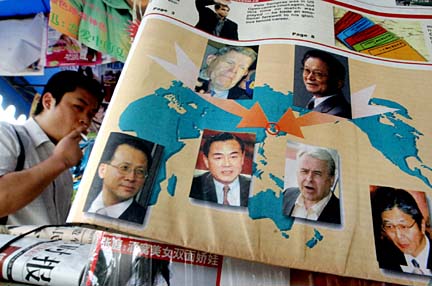
ASSOCIATED PRESS
Six nations held talks last week to defuse the North Korea nuclear crisis in Beijing. A Chinese man, above, stands near a newspaper showing photos of the six representatives superimposed on a world map in Beijing.
Korea pact elusive
but not unattainable
"Surrender means death!" This pretty much summed up North Korea's opening position at the just-concluded Aug. 27-29 Six-Party Talks in Beijing. The U.S. insistence that North Korea dismantle its nuclear program "fully, verifiably and irreversibly" in advance of dialogue (or rewards) "is little short of demanding that the DPRK surrender," proclaimed Pyongyang, demanding "confirm- ation that the U.S. has dropped its hostile policy" as a precondition to progress.
To demonstrate its "fundamental switchover," Washington must conclude "a legally binding nonaggression treaty and establish diplomatic relations" and promise not to "obstruct (North Korea's) economic cooperation" (read: weapons sales) with other countries.
For its part, Washington steadfastly refused to offer a bilateral nonaggression pact, even while hinting that some type of multilateral security assurances might be provided. But Pyongyang declared that any collective security guarantee would be "meaningless."
Given the unyielding positions of the two main protagonists, it is little wonder that nothing of substance was achieved during the initial round of talks beyond agreeing to meet again (and even this is tentative). But this does not mean that long-term prospects are hopeless.
There are several points on which all six already agree. First is that a war on the Korean peninsula serves no one's interests. While North Korea issues threats of nuclear Armageddon almost daily, it realizes that the outcome of any major confrontation (nuclear or not) will be the destruction of the North Korean state. Nor does Washington seek a military solution, given its preoccupation elsewhere and the high costs in terms of lives lost (South Korean and American as well as North Korean).
While few in Seoul, Tokyo, Beijing or Moscow would shed tears if Kim Jong-Il were to be eliminated tomorrow -- the latter two see the utility of a North Korean buffer state, but not necessarily under Kim's rule -- the uncertainty and costs involved in bringing about regime change in North Korea, at least at present, are higher than the presumed benefits.
As a result, all seem prepared to live with an outcome that leaves the current North Korean regime in place. One suspects that there is some doubt in North Korea about this, and clearly there are elements in Washington that believe that a North Korean regime change is not only desirable but essential, but this does not reflect official U.S. policy as articulated by President Bush. A peaceful outcome is the top priority, even if helps perpetuates the reprehensible Kim regime.
There is a final point on which all six should, and must, agree before a peaceful solution can be assured: that the presence of nuclear weapons in North Korea decreases the prospects for peace and stability in East Asia, and makes conflict on the peninsula more rather than less likely. Five out of six are already convinced: South Korea and Japan have joined the United States in stating unequivocally that North Korea's nuclear weapons program cannot be tolerated and will result in further isolation and hardship in the North, and both China and Russia have issued forceful demands that North Korea give up its nuclear ambitions and return to the Nuclear Nonproliferation Treaty regime. Pyongyang remains to be convinced.
Obviously, Pyongyang has concluded that its previous confrontational tactics were becoming counterproductive. Hence its agreement to enter into multilateral discussions. But it is unclear if it believes that its current conventional military power -- which puts the lives of Seoul's 12 million-plus inhabitants (including tens of thousands of Americans on any given day) at risk -- is sufficient to prevent the military option from being exercised, absent an additional nuclear security blanket. More important, Pyongyang sees little reason to believe that Beijing or especially Seoul really will withhold economic life support.
As the first round of talks ends and the leaks and rumors about what transpired begins in earnest, world attention appears to be focused on the remarks being uttered by Washington and Pyongyang, even though, as expected, neither went much beyond reiterating its already clearly stated positions. Instead, we should be paying closest attention to the comments coming from Seoul and Beijing and Moscow. Unless and until Pyongyang believes that these traditionally more sympathetic states are prepared to play hardball in demanding an end to Pyongyang's nuclear program -- thus making a continuation of this program a net minus rather than a perceived net plus -- it is unlikely to take the negotiating process seriously. It will be pressure from these states, not from Washington, that will determine if Pyongyang shows up at future meetings and, more important, approaches them in a constructive manner. Stay tuned.
Ralph A. Cossa is president of the Pacific Forum CSIS, a Honolulu-based nonprofit research institute, and senior editor of Comparative Connections.
